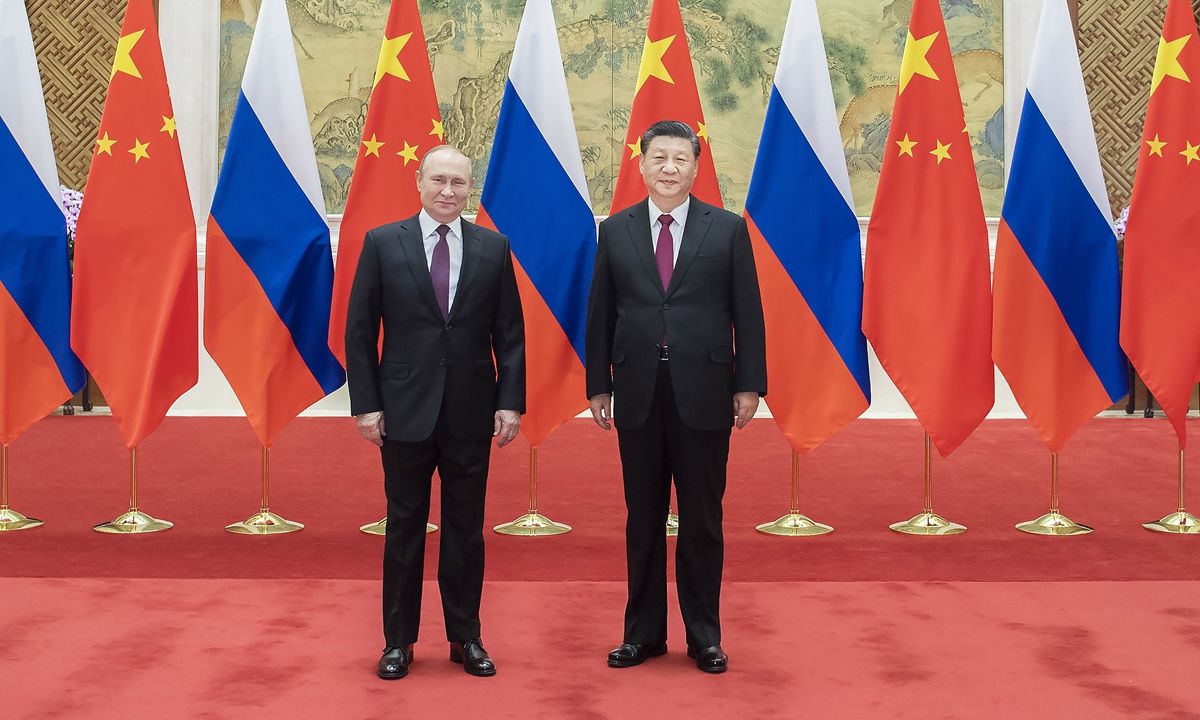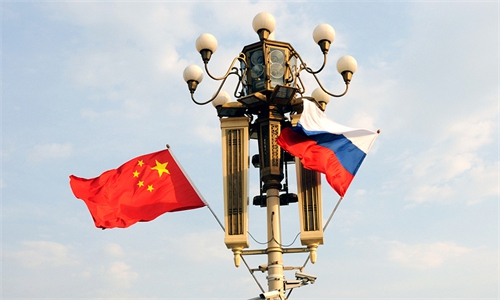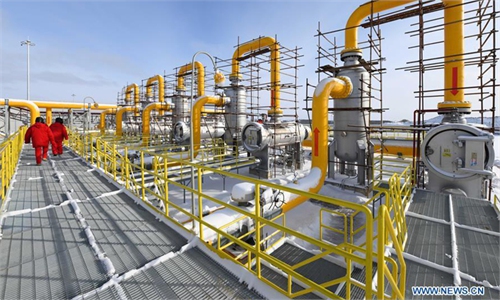
Chinese President Xi Jinping (right) meets and holds talks with visiting Russian President Vladimir Putin at the Diaoyutai State Guesthouse in Beijing on February 4, 2022. Photo: Xinhua
Amid profound changes unseen in a century and the still-raging COVID-19 pandemic, major power competition is heating up and uncertainty is growing.
A few US-led Western countries have blatantly violated the Olympic spirit and attempted to politicize and stigmatize the Beijing Winter Olympic Games.
Amid this backdrop, Russian President Vladimir Putin accepted an invitation to attend the opening ceremony of the Beijing events, fully demonstrating Russia's resolute opposition to using the Olympic Games as a tool of suppression and unfair competition. The move also shows that Moscow cherishes China-Russia relations - a new type of major power relationship with the highest mutual trust, coordination and strategic values.
Putin's visit to Beijing was his first in the wake of China and Russia officially extending the China-Russia Treaty of Good-Neighborliness and Friendly Cooperation. It is a milestone for the two countries to put into practice the concept of "no limit, no forbidden zone and no ceiling" in China-Russia relations, to open a brand new page, and promote mutual trust, thus pragmatically benefiting the peoples of both nations.
Currently, cooperation between China and Russia has a solid foundation with plentiful results.
First, cooperation on energy is the key sphere. In 2021, energy trading was about one-third of China-Russia's total trade volume. Russia has become China's second-largest source of oil imports, second-largest source of coal imports and its largest source of electricity imports.
Second, agricultural cooperation is gradually becoming a highlight. China has become the third-largest export destination for Russian agricultural and food products since China partially opened access to Russia's meat products, grain and beans. Meanwhile, Russia has taken advantage of platforms like the China International Import Expo, with a plan to increase its exports to China to $7.7 billion by 2024.
Third, regional cooperation has made outstanding achievements. The Far East is an important region for China and Russia, with both actively promoting the implementation of a series of development plans.
Fourth, technology cooperation is getting closer. China and Russia have successfully held the Russia-China Year of Scientific and Technological Innovation. The two have jointly developed the CR929 wide-body passenger aircraft and 40-ton class heavy helicopter, and worked in the aerospace field, which includes the development of special material, a satellite system, and a plan to jointly build an international research station on the moon by 2035.
President Xi Jinping and President Putin on Friday exchanged in a profound way their views concerning China-Russia relations and international strategic stability, issuing the Joint Statement on the International Relations Entering a New Era and the Global Sustainable Development. The statement expresses the common grounds held by China and Russia on democracy, development, security and order. Additionally, the two countries signed 15 cooperation deals ranging from energy, trade and investment, to aerospace and digital economy.
In terms of energy cooperation, Gazprom and China National Petroleum Corporation (CNPC) signed a long-term Sales and Purchase Agreement for natural gas to be supplied via the Far Eastern route. In the field of trade and investment, China and Russia adopted a joint statement on the completion of a roadmap for the high-quality development of Russian-Chinese trade in goods and services.
The package of documents also includes an agreement on cooperation to ensure compatibility and interoperability of GLONASS and BeiDou navigation satellite systems in terms of the system time scales, and an agreement on cooperation in the field of information development and digitalization between Rosneft and Huawei Technologies for a period reaching 2027.
The inking of the above-mentioned deals is essential to promote the China-Russia energy trade, investment, technology and service, cooperative and comprehensive coordinated development, exploration of comprehensive cooperation in agriculture industry chains and diversified integration, deepen the innovation of science and technology, and advance investment cooperation in the field of digital economy. These deals will certainly accelerate China-Russia's practical cooperation and ensure its steady and long-term progress.
The author is a fellow at the Russian, East European and Central Asian Studies Institute of the Chinese Academy of Social Sciences. opinion@globaltimes.com.cn


